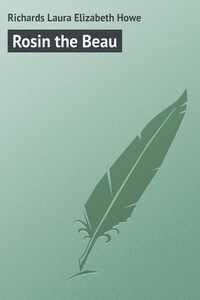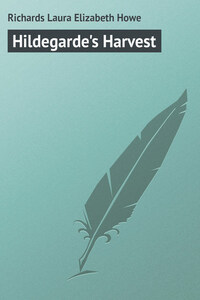It was a pleasant place. The house was a large, low, old-fashioned one, with the modern addition of a deep, wide verandah running across its front. Before it was a circular sweep of lawn, fringed with trees; beside it stood a few noble elms, which bent lovingly above the gambrel roof. There were some flower-beds, rather neglected-looking, under the south windows, and there was a kitchen-garden behind the house. This was all that Hildegarde Grahame had seen so far of her new home, for she had only just arrived. She stood now on the verandah, looking about her with keen, inquiring eyes, a tall, graceful girl, very erect, with a certain proud carriage of the head. Her dress of black and white shepherd's plaid was very simple, but it fitted to perfection, and there was a decided "air" to her little black felt hat.
Hildegarde's father had died about six months before the time our story opens. He had been very wealthy, but many of his investments had shrunk in value, and the failure of a bank whose cashier had proved dishonest entailed heavy losses upon him; so that, after his death, it was found that the sum remaining for his widow and only child, after all debts were paid, was no very large one. They would have enough to live on, and to live comfortably; but the "big luxuries," as Hildegarde called them, the horses and carriages, the great New York house with its splendid furniture and troops of servants, must go; and go they did, without loss of time. Perhaps neither Hildegarde nor her mother regretted these things much. Mrs. Grahame had been for years an indefatigable worker, giving most of her time to charities; she knew that she should never rest so long as she lived in New York. Hildegarde had been much in the country during the past two years, had learned to love it greatly, and found city life too "cabined, cribbed, confined," to suit her present taste. The dear father had always preferred to live in town; but now that he was gone, they were both glad to go away from the great, bustling, noisy, splendid place. So, when Mrs. Grahame's lawyer told her that an aged relative, who had lately died, had left his country house as a legacy to her, both she and Hildegarde said at once, "Let us go and live there!"
Accordingly, here they were! or to speak more accurately, here Hildegarde was, for she and auntie (auntie was the black cook; she had been Mrs. Grahame's nurse, and had been cook ever since Hildegarde was a baby) had come by an early train, and were to have everything as comfortable as might be by the time Mrs. Grahame and the little housemaid, who had stayed to help her pack the last trifles, should arrive in the afternoon.
It was so pleasant on the wide verandah, with the great elms nodding over it, that Hildegarde lingered, until a mellow "Miss Hildy, chile! you comin'?" summoned her in-doors. Auntie had already put on her white jacket and apron, without which she never considered herself dressed, and her muslin turban looked like a snow-drift on an ebony statue. She had opened the door of a large room, and was peering into it, feather duster in hand.
"'Spose this is the parlour!" she said, with a glance of keen observation. "Comicalest parlour ever I see!"
Hildegarde stepped lightly across the threshold. It was a singular room, but, she thought, a very pleasant one. The carpet on the floor was thick and soft, of some eastern fabric, but so faded that the colours were hardly distinguishable. Against the walls stood many chairs, delicate, spider-legged affairs, with cushions of faded tapestry. The curtains might once have been crimson, when they had any colour. A table in the exact centre of the room was covered with a worked cloth of curious and antique pattern, and on it were some venerable annuals, and "Finden's Tableaux," bound in green morocco. In a dim corner stood the great-grandmother of all pianos. It was hardly larger than a spinnet, and was made of some light-coloured, highly polished wood, cunningly inlaid with ivory and mother-of-pearl. Over the yellow keys was a painting, representing Apollo (attired, to all appearance, like the "old man on a hill," in his grandmother's gown), capering to the sound of his lyre, and followed by nine young ladies in pink and green frocks. The last young lady carried a parasol, showing that the Muses thought as much of their complexions as other people do. At sight of this venerable instrument Hildegarde uttered a cry of delight, and, running across the room, touched a few chords softly. The sound was faint and tinkling, but not unmusical. Auntie sniffed audibly.
"Reckon my kittle makes a better music 'an that!" she said; and then, relenting, she added, "might ha' been pooty once, I dassay. That's a pooty picture, anyhow, over the mankel-piece."
Hildegarde looked up, and saw a coloured print of a lady in the costume of the First Empire, with golden ringlets, large blue eyes, particularly round rosy cheeks, and the most amiable simper in the world. Beneath was the inscription, "Madame Récamier, Napoleon's first love."














